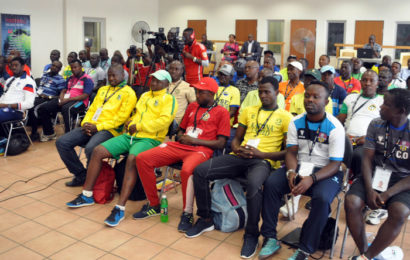 The European Union and Nigerian officials are expected to reach a centre piece as deliberation on sending economic migrants back home begins this week in Abuja. This development is part of the bloc’s latest move to stem the exodus of Africans to Europe.
The European Union and Nigerian officials are expected to reach a centre piece as deliberation on sending economic migrants back home begins this week in Abuja. This development is part of the bloc’s latest move to stem the exodus of Africans to Europe.
The delegation of 15 EU officials to the Nigerian capital will also be discussing plans to direct private European money to infrastructure projects in the west African country.
This is part of a longer term goal to raise up to €60bn of private funds to stem migration from nations including Nigeria. Diplomats say all this is aimed at addressing not only the ramifications of migration in Europe, but also dealing with the root causes of migration from the world’s poorest continent.
The EU has already outlined plans to retarget about €8bn during the next four years to help countries with large numbers of would-be migrants. “There is a lot more emphasis now on the role of private sector investment … and not just development aid,” said one European diplomat in Abuja. “We are seeing political attention in Brussels that certainly in the case of Nigeria did not exist before.”
But the “return and readmission” deal the EU is seeking first with Nigeria and then with four other states, including Ethiopia and Niger, is the sharpest tool in the EU’s arsenal — and the most technical and sensitive aspect. It is not clear how many Africans would be returned but Preben Aamann, an EU spokesman, said last week that “there are virtually no Syrians” among the nearly 132,000 people who have arrived in Italy this year. The EU says most of them will have their claims for asylum rejected. This makes their “readmission”, or deportation to Africa, “a key issue for European diplomacy”, he said.
Officials have set specific targets. “We want to reach 50 per cent within the next three or six months and we want to reach 75 per cent in 18 or 24 months,” one official said. “We want an overarching EU-level deal … certainly the sooner the better,” he said.
Citizens from Nigeria, Africa’s most populous nation, constitute the largest number of arrivals by sea to Italy this year. Most are fleeing poverty, not the violent Boko Haram insurgency in their country’s north-east, according to both the EU and Nigeria. On the table are proposals to bring Nigerian officials to Italy to identify citizens who have either lost or destroyed their identification documents.
The focus on Africa comes after the EU stemmed the flow of refugees from the Middle East, after it inked a contentious deal with Turkey and closed Greece’s borders. The chaotic mass movement to Europe that began in 2015 and was sparked by the war in Syria has deeply divided the bloc.
But migration from Africa began earlier, spiking in 2014. Officials say they think structural pressures such as slowing growth, high unemployment and widespread poverty will continue to drive people to leave Africa. Nigeria’s population of nearly 200m will double by 2050, a statistic that is increasingly raising alarm because infrastructure and services in the country are already at breaking point.
Italian officials will welcome the start of the talks. They have often complained that the EU response to the migration crisis has been far too timid.
They caution that the €3bn Turkey deal will make negotiations difficult as it has raised expectations of a similar pay-off for African countries. They also question if African countries even have the capacity to stop the flow of migrants.








